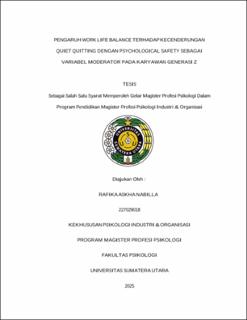Pengaruh Work Life Balance terhadap Kecenderungan Quiet Quitting dengan Psychological Safety sebagai Variabel Moderator pada Karyawan Generasi Z
The Influence of Work Life Balance on the Tendency of Quiet Quitting with Psychological Safety as A Moderator Variable among Generation Z Employees

Date
2025Author
Nabilla, Rafika Askha
Advisor(s)
P, Vivi Gusrini Rahmadani
Eliana, Rika
Metadata
Show full item recordAbstract
This study examines the effect of work-life balance on quiet quitting tendencies with
psychological safety as a moderator variable. Quiet quitting refers to a condition when
employees only carry out minimum tasks without more involvement in work. The
research respondents were 343 generation z employees working in various industrial
sectors in Indonesia with permanent employee status and a minimum of one year of
service. The sample in this study was selected using the convenience sampling method.
Then, the data were analyzed using the AMOS-based structural equation modeling
(SEM) analysis method technique. The results showed that work life balance and
psychological safety both have a negative influence on quiet quitting. It was also found
that work life balance has a negative and significant effect on the tendency of quiet
quitting. Furthermore, psychological safety strengthens the negative relationship
between work life balance and quiet quitting. This research emphasizes the importance
of creating work-life balance and a sense of psychological safety in the workplace,
especially for generation z employees
